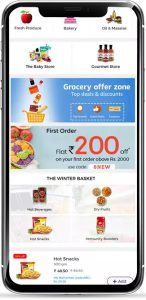In the fast-paced digital era, the United Kingdom’s culinary landscape is undergoing a transformative shift, thanks to the emergence of cutting-edge food delivery apps. This comprehensive guide explores the intricate process of food delivery app development in the UK, shedding light on the key factors influencing this industry’s growth. From user-friendly interfaces to advanced features, we delve into the crucial elements that contribute to the success of food delivery apps.

Introduction: The advent of technology has significantly altered consumer behavior, and the food industry is no exception. With the rising demand for convenience, food delivery apps have become an integral part of the culinary experience in the United Kingdom. This article aims to provide a deep dive into the world of food delivery app development, focusing on the unique challenges and opportunities in the UK market.
Understanding the Dynamics of Food Delivery App Development: To comprehend the complexities of food delivery app development in the UK, it’s essential to explore the intricacies involved in creating a seamless user experience. From intuitive interfaces to robust backend systems, developers must navigate through various challenges to ensure optimal performance.
User-Friendly Interfaces: The success of any food delivery app hinges on its user interface. Engaging designs, intuitive navigation, and responsive layouts are paramount to keeping users hooked. This section explores how developers prioritize user experience to create interfaces that cater to the diverse preferences of UK consumers.
Advanced Features: Beyond basic functionality, successful food delivery apps distinguish themselves with innovative features. From real-time tracking to personalized recommendations, developers leverage advanced technologies to enhance the overall user experience. We discuss how incorporating these features can set a food delivery app apart in the competitive UK market.
Key Considerations in Food Delivery App Development: The UK market presents unique challenges and opportunities for food delivery app developers. This section highlights the key considerations that shape the development process, ensuring that apps are tailored to meet the specific needs of the local consumer base.
Localized Cuisine Integration: The UK boasts a rich culinary tapestry with diverse regional cuisines. Successful food delivery apps understand the importance of integrating localized cuisines into their platforms. We explore how developers collaborate with local restaurants to offer an authentic and varied dining experience.
Seamless Payment Solutions: Security and convenience are paramount when it comes to payment solutions. This section discusses the importance of integrating secure and user-friendly payment gateways to build trust among consumers in the UK.
The Role of Technology in Food Delivery App Success: Technology forms the backbone of any successful food delivery app. From artificial intelligence to data analytics, developers harness the power of technology to streamline operations, enhance user experiences, and stay ahead in the competitive market.
Optimizing Delivery Routes with AI: In a country as diverse as the UK, optimizing delivery routes is crucial for timely and efficient service. We explore how artificial intelligence is employed to analyze data and optimize delivery routes, ensuring prompt and reliable service to customers across the nation.
Data-Driven Decision-Making: The collection and analysis of data play a pivotal role in shaping the success of food delivery apps. This section delves into how developers leverage data analytics to make informed decisions, personalize user experiences, and stay ahead of market trends in the UK.
Challenges and Future Trends in Food Delivery App Development: While the food delivery app industry in the UK is flourishing, it is not without its challenges. This section examines the hurdles developers face and anticipates the future trends that will shape the landscape of food delivery in the UK.
Regulatory Compliance: Navigating the regulatory landscape is a significant challenge for food delivery app developers. We explore how developers address compliance issues and work towards creating platforms that adhere to local regulations in the UK.
The Rise of Ghost Kitchens: The concept of ghost kitchens is gaining momentum in the UK. We discuss how food delivery apps are adapting to this trend, collaborating with virtual kitchens to expand their offerings and cater to evolving consumer preferences.
Conclusion: In conclusion, the world of food delivery app development in the UK is dynamic and multifaceted. From prioritizing user experience to overcoming regulatory challenges, developers must navigate through a myriad of factors to create successful and sustainable platforms. As technology continues to evolve, the future holds exciting possibilities for food delivery apps in the UK, promising an even more seamless and personalized dining experience for consumers across the nation.